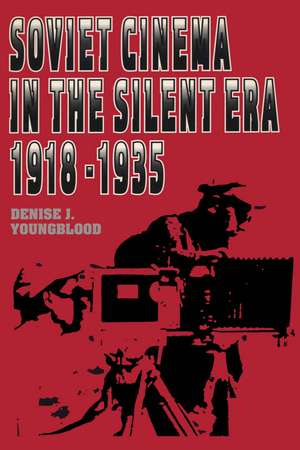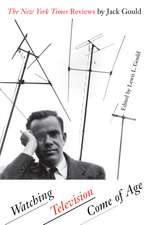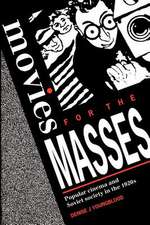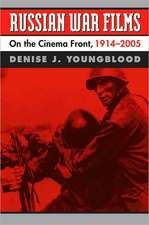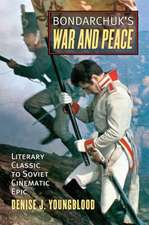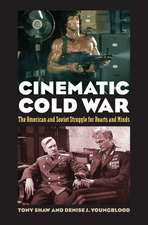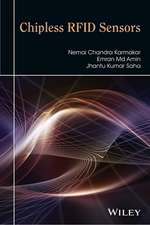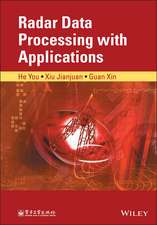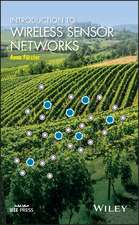Soviet Cinema in the Silent Era, 1918–1935: Texas Film and Media Studies Series
Autor Denise J. Youngblooden Limba Engleză Paperback – mai 1991
Soviet Cinema in the Silent Era, 1918–1935 records this lost golden age. Denise Youngblood considers the social, economic, and industrial factors that influenced the work of both lesser-known and celebrated directors. She reviews all major and many minor films of the period, as well as contemporary film criticism from Soviet film journals and trade magazines. Above all, she captures Soviet film in a role it never regained—that of dynamic artform of the proletarian masses.
Din seria Texas Film and Media Studies Series
-
 Preț: 199.85 lei
Preț: 199.85 lei -
 Preț: 202.07 lei
Preț: 202.07 lei -
 Preț: 240.63 lei
Preț: 240.63 lei -
 Preț: 277.53 lei
Preț: 277.53 lei -
 Preț: 262.40 lei
Preț: 262.40 lei -
 Preț: 277.16 lei
Preț: 277.16 lei -
 Preț: 203.73 lei
Preț: 203.73 lei -
 Preț: 201.40 lei
Preț: 201.40 lei -
 Preț: 279.83 lei
Preț: 279.83 lei -
 Preț: 196.60 lei
Preț: 196.60 lei -
 Preț: 277.16 lei
Preț: 277.16 lei -
 Preț: 198.89 lei
Preț: 198.89 lei -
 Preț: 241.38 lei
Preț: 241.38 lei -
 Preț: 166.47 lei
Preț: 166.47 lei -
 Preț: 166.47 lei
Preț: 166.47 lei - 23%
 Preț: 501.82 lei
Preț: 501.82 lei - 23%
 Preț: 615.45 lei
Preț: 615.45 lei -
 Preț: 277.16 lei
Preț: 277.16 lei -
 Preț: 240.63 lei
Preț: 240.63 lei -
 Preț: 203.34 lei
Preț: 203.34 lei -
 Preț: 203.73 lei
Preț: 203.73 lei -
 Preț: 288.31 lei
Preț: 288.31 lei
Preț: 277.16 lei
Nou
Puncte Express: 416
Preț estimativ în valută:
53.05€ • 57.64$ • 44.59£
53.05€ • 57.64$ • 44.59£
Carte tipărită la comandă
Livrare economică 21 aprilie-05 mai
Preluare comenzi: 021 569.72.76
Specificații
ISBN-13: 9780292776456
ISBN-10: 0292776454
Pagini: 352
Dimensiuni: 152 x 229 x 28 mm
Greutate: 0.58 kg
Ediția:Univ of Texas P
Editura: University of Texas Press
Colecția University of Texas Press
Seria Texas Film and Media Studies Series
ISBN-10: 0292776454
Pagini: 352
Dimensiuni: 152 x 229 x 28 mm
Greutate: 0.58 kg
Ediția:Univ of Texas P
Editura: University of Texas Press
Colecția University of Texas Press
Seria Texas Film and Media Studies Series
Notă biografică
Denise J. Youngblood, a former executive director of the Association for the Advancement of Soviet Studies, is Professor of History at the University of Vermont.
Cuprins
- Preface
- Preface to the Paperback Edition
- Introduction
- 1. Beginnings (1918–23)
- 2. The Turning Point (1924)
- 3. The New Course: Sovkino Policy and Industry Response (1925–26)
- 4. Filmmaking and Films (1925–26)
- 5. Sovkino under Fire (1927–28)
- 6. The Crisis in Production (1927–28)
- 7. The Party Conference and the Attempt to Restructure (1928–29)
- 8. The Purge Years and the Struggle against Formalism (1929–34)
- 9. The Advent of Sound and the Triumph of Realism (1928–35)
- Conclusion
- Appendix 1. Film Production by Studio by Year (1918–35)
- Appendix 2. Genres by Year
- Notes
- Bibliography
- Index
Recenzii
Denise J. Youngblood’s informative study . . . offers a striking assessment of film’s role as the ‘dynamic art form of the proletarian masses’ in the years following the 1917 Russian revolution. The book reviews the work of Eisenstein, Pudovkin, Kuleshov and other Soviet filmmakers in a comprehensive coverage of an intensely creative period.
Denise Youngblood is a pioneer. On the basis of having seen every available Soviet silent film and read all existing film journals, [she] successfully describes the problems and debates that occupied Soviet film people in the golden age.
Descriere
A study of the lost golden age of Soviet cinema, which was a time of both achievement and contradiction, as reflected in the films of Eisenstein, Pudovkin, and Kuleshov.
